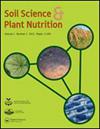A low boron condition without high temperature stress induces internal browning in Raphanus sativus L. (Japanese radish)
IF 1.8
4区 农林科学
Q3 ENVIRONMENTAL SCIENCES
引用次数: 0
Abstract
ABSTRACT Brown heart, or internal browning, is a physiological disorder in crops including radish. It is characterized by brown pigmentation in the internal tissue, which significantly reduces commercial value of the products. Field studies have revealed that the appearance of symptom is correlated with several stresses, including drought, high temperature, and boron deficiency. However, fluctuating and non-reproducible environmental factors in field experiments complicate the interpretation of the direct cause of the symptom. For studying the mechanism of the symptom, experiments under more controlled conditions with less fluctuating environmental factors are desirable. Here, we established culture method to observe brown heart in lab condition, where light, temperature, and nutrient is controlled. Under our culture conditions, we successfully observed internal browning in Japanese radish by lowering boron concentrations without heat and drought stresses, indicating that boron deficiency alone can cause internal browning. Furthermore, we cultured three cultivars and observed differences in susceptibility to internal browning, establishing that our culture method is applicable for studies that utilize inter-cultivar variations, such as QTL mapping.低硼条件下无高温胁迫诱导萝卜内部褐变
褐心,或内部褐变,是包括萝卜在内的作物的一种生理失调。其特点是内部组织中有棕色色素沉着,这大大降低了产品的商业价值。田间研究表明,该症状的出现与干旱、高温、缺硼等多种胁迫有关。然而,在现场实验中,波动和不可重复的环境因素使对该症状的直接原因的解释复杂化。为了研究症状的机制,需要在更可控的条件下进行实验,环境因素波动较小。在此,我们建立了在实验室条件下,在光、温度和营养条件下观察褐心的培养方法。在我们的培养条件下,我们成功地观察到,在没有高温和干旱胁迫的情况下,降低硼浓度可以使萝卜内部褐变,这表明缺硼可以引起萝卜内部褐变。此外,我们还培养了三个品种,观察了它们对内部褐变的敏感性差异,证实了我们的培养方法适用于利用品种间变异的研究,如QTL定位。
本文章由计算机程序翻译,如有差异,请以英文原文为准。
求助全文
约1分钟内获得全文
求助全文
来源期刊

Soil Science and Plant Nutrition
农林科学-农艺学
CiteScore
4.80
自引率
15.00%
发文量
56
审稿时长
18-36 weeks
期刊介绍:
Soil Science and Plant Nutrition is the official English journal of the Japanese Society of Soil Science and Plant Nutrition (JSSSPN), and publishes original research and reviews in soil physics, chemistry and mineralogy; soil biology; plant nutrition; soil genesis, classification and survey; soil fertility; fertilizers and soil amendments; environment; socio cultural soil science. The Journal publishes full length papers, short papers, and reviews.
 求助内容:
求助内容: 应助结果提醒方式:
应助结果提醒方式:


